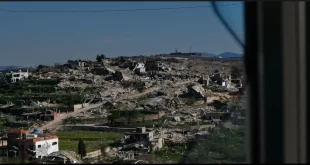by Firas al-Shoufi, published on The Cradle, December 21, 2022
On 15 December, a bill introduced by US lawmakers into the 2023 Department of Defense budget to “Combat the Syrian Regime’s Drug Trade,” passed the Senate, with the support of 83 senators and the opposition of 11.
The Countering Assad’s Proliferation Trafficking And Garnering Of Narcotics Act or the CAPTAGON Act, which passed in the joint congressional committees between the House of Representatives and the Senate, is supposed to become law after US President Joe Biden soon signs the National Defense Authorization Act (NDAA) for Fiscal Year 2023.
The bipartisan bill inaugurates a new phase of US pressure on Syria, and is another pretext to increase the siege on the Syrian people, who suffer from extremely difficult economic conditions similar to those they suffered during the famine that the region witnessed during the First World War.
Severe US-imposed sanctions under the “Caesar Act” have contributed to the tragedy of the Syrians, at a time when the country is in the midst of an economic crisis, with the US occupation and the Kurdish Autonomous Administration controlling vast areas of lands rich in oil, gas, and agricultural crops in the east of the country, in addition to the Turkish occupation of other regions.
Further sanctions
Nevertheless, Washington is preparing to impose more sanctions, this time under the pretext of combating narcotics networks manufacturing and smuggling Captagon from Syria across West Asia and perhaps to the US.
Republican Representative French Hill, who first introduced the bill last year, considers the matter a threat to international security and has branded Syria as a “narco-state.” However an anonymous Syrian government source, who spoke to The Cradle believes otherwise:
“The CAPTAGON Act is an American way to impose additional sanctions on the Syrian government and to penetrate more into neighboring countries. The Americans make up many excuses, but the goal is one: to starve Syrian people and bring down the state. This looks like a revenge operation and a way to dominate Syria.”
“They know that when the state weakens, terrorist and criminal groups advance, but instead of helping the Syrian state, they increase its siege,” he added.
The CAPTAGON Act considers “the Captagon trade linked to the (Syrian President) Bashar al-Assad regime a transnational security threat, requiring a strategy by the United States Government to disrupt and dismantle the Captagon trade and narcotics networks of Bashar al-Assad in Syria.”
Disrupting the drugs trade network
The bill demands presenting the required strategy to Congress for review within a period not exceeding 180 days of its approval, provided that the method includes providing support to partner countries of the region that receive large quantities of smuggled Captagon, such as Saudi Arabia.
The lawmakers urge the Biden administration to employ the sanctions effectively, including the Caesar Act, to target drug networks said to be affiliated with the state.
The strategy includes a public communication campaign to increase awareness of the extent of the connection of Damascus to the illicit narcotics trade, a description of the countries receiving or transiting large shipments of Captagon, and an assessment of the counter-narcotics capacity of such countries to interdict or disrupt the smuggling of the highly-addictive amphetamine.
Lawmakers have also called for the strategy to include a plan for leveraging multilateral institutions and cooperation with international partners to disrupt the narcotics infrastructure in the country.
War by other means
Practically, “this strategy constitutes an integrated plan, security, political and economic, to penetrate more into the vicinity of Syria and encircle it and prevent access to raw materials,” according to Syrian researcher Bassam Abdullah:
“The terminologies contained in the law are broad, and lead to American-style solutions: providing security and diplomatic support and cooperation to countries to spy on Syria, targeting individuals and entities with sanctions, exerting economic pressure on Damascus in cooperation with international partners, and launching media campaigns against the Syrian government.”
Abdullah believes that “the aim of this law is to demonize Syria, not to solve the Captagon crisis in which the Americans claim Syria’s involvement, and it is a continuation of the war in other forms.”
The aforementioned Syrian government source pointed out that Washington, “Under the pretext of suspected drug transportation, may use such a strategy to stop shipments of food, oil and raw materials, and to cause more damage to the import and export chains, which are suffering from a significant decline.”
Indeed, other Arab security sources, who have asked to remain anonymous, have revealed to The Cradle that the information circulating between agencies cooperating with the US Drug Enforcement Administration indicates that “the raw materials used in the Captagon industry come from China and India, and it is involved in many other industries.”
The issue isn’t Syria’s alone
One Syrian security source informed The Cradle that: “Syria has historically been a transit country. But terrorist and criminal gangs took advantage of the conditions of war for industrialization, promotion, and smuggling. Some of these gangs receive western support and are active in areas under American control.”
He confirms that the government, which is regaining its strength, “is working to strike these gangs, and the Syrian apparatus is making every effort to combat drugs. What we need is help, not more blockades.”
For Abdullah, “Damascus has reactivated its membership in Interpol. If the Americans or others have information, Syria is ready to cooperate. Americans always want to play the role of the world’s policeman who decides and punishes. This is how the unilateral mind thinks.”
He asks: “Does anyone really believe that America wants to combat drugs and not tighten the blockade?”
“Afghanistan is the best model. During the twenty years of the American occupation, what witnessed an increase: wheat cultivation or the cultivation and manufacture of narcotic plants?”
Cooperation, not conflict with Damascus
In March 2021, the Syrian delegate to the UN and other international organizations in Vienna, Hassan Khaddour, declared before the UN Drugs Committee that the illicit narcotics problem in Syria had worsened due to the control of terrorist organizations supported by several countries over some border areas.
He pointed out that this created a suitable environment for the smuggling and trade of drugs, and provided huge financial revenues for financing terrorist groups. The Syrian ambassador asked for international cooperation with Syria, a permanent exchange of information, and providing the Syrian government with technical capabilities, laboratory equipment, and detection devices at the border crossings.
Although the implementation strategy of the latest hostile US legislation against Syria is not yet clear – and whether they include military strikes or security sabotage under the pretext of combating drugs – sources close to the Americans in Beirut say that there are intentions to launch unidentified attacks against drug production sites in Syria.
However, the Syrian security source comments by saying, “This is pure fabrication, because the hostile strikes target the Syrian Arab Army (SAA) and its sites. The Americans always fabricate lies to justify their aggression, as the Israelis do.”
 Syria Support Movement solidarity with the Syrian people
Syria Support Movement solidarity with the Syrian people





